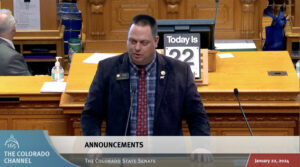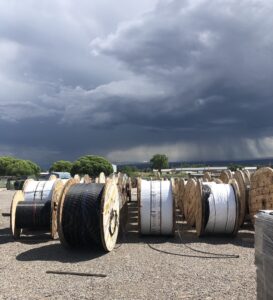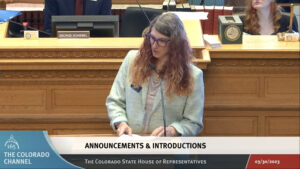While state broadband officials ready their action plan to expand fiber to 99% of Colorado, a dispute over the amount of fees that telecommunications companies must pay to install lines along public rights of way has stalled dueling legislative efforts to define those fees.
A bipartisan quartet of legislators introduced Senate Bill 91 just two weeks into the 2024 session on Jan. 24 at the behest of Colorado Counties Inc. and rural telecom companies. The bill lets the Colorado Department of Transportation impose a one-time permitting fee to lay broadband fiber along rights of way but prohibits it from charging annual fees — reversing a policy enacted in December by the Colorado Transportation Commission.
Meanwhile, the Joint Technology Committee continues to work on a separate bill that would pull the new fees generated from broadband providers into a state enterprise so that the money is exempt from the Taxpayer’s Bill of Rights revenue cap. A draft version of the bill supplied to The Sum & Substance would require imposition of both a one-time administrative fee and annual fees, though it doesn’t define what those fees would be.
Fees discussion revolves around broadband grants
Rural county commissioners and telecommunications providers say that the state’s decision to charge an annual fee will reduce the amount of the $826 million in federal funding that it can put to expanding broadband to remote areas of Colorado. The Broadband, Equity, Access and Deployment (BEAD) grants available through the 2021 Infrastructure Investment and Jobs Act are expected to be the last major pot of money coming from Washington D.C. and must be used carefully and spent by 2027, they say.
“CDOT was asking for an exorbitant amount of fees that would just be passed onto the residents of northeastern Colorado,” said Sen. Byron Pelton, the Sterling Republican who is cosponsoring SB 91 with Democratic Sen. Kyle Mullica of Federal Heights. “It’s starting to look to me that CDOT wants to get its hands in the money coming from the federal government for broadband.”

Colorado state Sen. Byron Pelton speaks in the Senate earlier in the 2024 legislative session.
But CDOT Executive Director Shoshana Lew told the CTC that state law requires fair-market-value reimbursement for use of the public land, and her department rewrote its proposal two times in the face of opposition, lowering proposed fees by 90%. Several members of the JTC have come to the department’s defense, arguing that broadband companies have resisted being regulated like the utilities that get free access to rights of way and therefore should not get the same benefits as those companies.
“From my perspective, the right of way belongs to the people” said Rep. Brianna Titone, D-Arvada, during a Feb. 8 Joint Technology Committee meeting. “And if a private company is going to use it — and especially if they’re going to get money from the federal government, our money — they should compensate us for it.”
Compromise an option
SB 91 was scheduled for its first committee hearing more than a month ago but was pulled from the Senate Transportation and Energy Committee agenda shortly before the planned hearing and hasn’t emerged on the calendar since. Pelton said that he and other bill supporters are talking with JTC members about whether a compromise between their proposals can be reached, though he said in a recent interview that negotiations haven’t produced a clear path forward yet.
One potential route, both sides have said, is to create an enterprise for the fees and put some limit on the fees that can be charged. But there remains a huge chasm between JTC members who believe some fees should be placed on companies using public land and SB 91 proponents who say unnecessary costs could be the difference between providers running broadband to a small rural community and them deciding not to do so.
La Plata County Commissioner Matt Salka is focused on getting broadband to far-flung parts of his community and allow for home-based businesses or remote workers to be able to connect quickly and flourish. While Salka knows broadband firms aren’t utilities, the reason the government is funding middle- and last-mile connections is because there is no viable business case to extend fiber to remote communities without it, meaning that money must be treated differently, he said.

La Plata County Commissioner Matt Salka
“No one wants to put a fiber line down to serve a couple of hundred homes,” Salka said in an interview. “We have a bunch of money coming in from BEAD … First and foremost, for me, is to support Senate Bill 91.”
One bill limits broadband right-of-way fees
When the federal government announced the pot of funding going to Colorado last summer, Gov. Jared Polis made a big splash of it, saying broadband expansion will help to close the economic gap between the Front Range and other parts of the state. Broadband office leaders want most funding to go to small, local companies and government agencies rather than large firms — a separate source of controversy — but local governments have said that the fee is as disruptive to those recipients as to national companies.
SB 91 would require CDOT to create a new permitting system with a one-time processing fee that does not exceed the department’s annual costs in connection with granting or administering the permits. It also would require CDOT to approve or deny a permit application within 30 days, specify a 30-year term for permits and prohibit the department from requiring permit recipients to lay additional fiber for use by the department or any third party.
A provision in SB 91 specifically bars CDOT from receiving fair-market-value compensation for the right-of-way land unless the Colorado attorney general determines that prohibition would violate federal law and result in the loss of federal money. If the AG’s office were to make that determination, CDOT still would be required to set the rate of fair-market value at a level that does not exceed the lowest rate established by any other state for access to right of way for broadband deployment.
Other bill creates enterprise for fees
The JTC proposal, meanwhile, lays out that the new broadband deployment enterprise — which would be housed in the Colorado Broadband Office rather than CDOT — would impose both a permitting fee and an additional access fee for deployment of broadband. Fee revenue would maintain public rights of way and broadband infrastructure, and the enterprise would enter into agreements with third parties to do so.

Broadband fiber sits ready to be laid by the Delta Montrose Electric Association
The draft JTC bill also notes that the fee structure would ensure that the state does not bear the financial risk of a broadband provider abandoning a broadband deployment project that uses public rights of way or existing fiber. It would transfer CDOT’s powers and duties in connection with right-of-way permitting and fee structure in connection with broadband deployment to the new enterprise in July 2025, around the time when installation is slated to ramp up.
Salka said that while he’s not opposed to creating an enterprise, he still questions where the fees will go and why it’s necessary.
Chasm remains on need for fees
“Why reinvent the wheel?” he asked. “We need to get this broadband money spent and fiber installed within a couple of years here.”
But to many members of the JTC, which has oversight responsibility for major state technology projects, the issue is ensuring that the money is spent responsibly and that the state is compensated for its costs.
Sen. Kevin Priola, a Henderson Democrat and vice chair of the JTC, noted, for example, that use of right of way could require replacement of asphalt or concrete or pulling of wires, and the state should be compensated for that maintenance. Priola also said that industry leaders and CDOT asked the JTC to mediate their disagreement over the proposed fee structure last summer but that the two sides never really got to talking.
“Better compromise” desired

Colorado state Rep. Brianna Titone speaks on the floor of the House.
Titone, the JTC chair, suggested in the Feb. 8 meeting that a potential compromise could involve setting annual fees at a “reasonable rate” and putting them into an enterprise. But said also that the CTC-passed policy already established costs at “more reasonable rates,” which stands in opposition to SB 91 supporters.
“I do think we need to come up with a better compromise and figure out how to offset the costs that will be incurred by the public sector,” Sen. Chris Hansen, a Denver Democrat and JTC member, said. “And I don’t think that SB 91 does that.”
Less than two months remain in the legislative session, leaving a limited amount of time for the two sides to find the hoped-for compromise.
